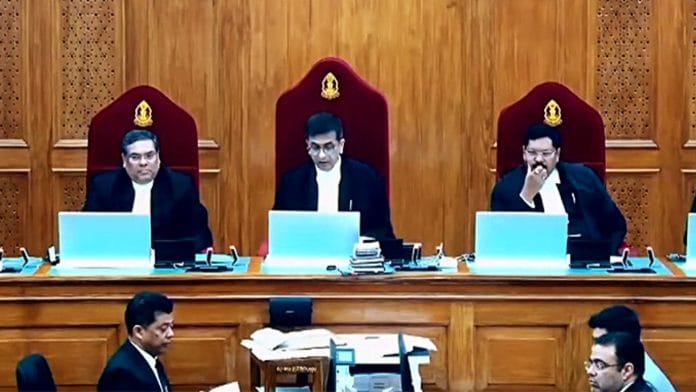New Delhi: The Supreme Court (SC) collegium Wednesday asserted its authority over judicial appointments in high courts, as it cleared the elevation of an advocate as a judge of the Kerala High Court. In doing so, the appointment panel rejected the Centre’s concern that the recommended candidate “is considered to be a CPI(M) sympathiser” and held the post of a government pleader, twice, in the Left Democratic Front (LDF) government.
Headed by Chief Justice of India D.Y. Chandrachud, the collegium, also comprising justices Sanjiv Khanna and B.R. Gavai, reiterated that a candidate’s political background may not be a “sufficient reason” to not consider him/her for elevation to the bench.
With this, the panel gave a go-ahead to the Kerala High Court (HC) collegium’s proposal to recommend Manoj Pulamby Madhavan’s name. It cleared five more names — advocates Abdul Hakhim Mullapally Abdul Aziz, Syam Kumar Vadakke Mudavakkat, Harisankar Vijayan Menon, Manu Sreedharan Nair and Easwaran Subramani — for HC judgeship.
The collegium resolution recommending Madhavan’s elevation as an HC judge refers to another HC appointment, which the panel cleared last year. That appointment was made even though the woman lawyer was an office-bearer of a political party prior to her elevation.
The resolution, signed by Chandrachud, Khanna and Gavai, did not mention the name of this candidate. However, the top court had in January last year recommended advocate Lekshmana Chandra Victoria Gowri’s name as a judge for the Madras HC. She was sworn in as a judge on 7 February.
Gowri’s appointment to the position was fraught with controversies, with many criticising the collegium for choosing her, given that she was an active member of the BJP until September 2020 when she took over as an assistant solicitor general.
Written objections were sent to the SC collegium against Gowri’s elevation. Though a petition challenging her appointment was heard by the SC on 7 February, ahead of her oath-taking ceremony, it dismissed the same.
In the case of Madhavan, the apex court said that the candidate being a Scheduled Caste candidate had sufficient practice at the Bar and is worthy of being appointed as a judge of the HC. Supreme Court judges who worked in the Kerala HC certified for Madhavan’s competence, which the collegium gave due weightage at the time of its recommendation.
His assignment as a government pleader, first in 2010 and then between 2016 and 2021 during the LDF dispensation was not a valid ground to reject his candidature, the collegium said. Rather, the panel saw it as an asset, considering in that role he practiced in diverse branches of law.
“The input that the candidate is considered to be a CPI(M) sympathiser is otherwise vague and bereft of cogent grounds,” the collegium noted.
Continuing with its effort to have wider representation in judiciary with lawyers who have specialised in different branches of law, the collegium approved the name of advocate Mudavakkat who has predominantly practiced maritime and shipping law.
The collegium brushed aside inputs given by one of the consultee-judges — those who have served in HC — in court that Mudavakkat’s practice concentrated mainly in admiralty law. It said, “In our considered opinion, his practice in other branches of law and specialisation in a particular jurisdiction make him eminently suitable for elevation to the HC, which has admiralty jurisdiction.”
Similarly, the collegium gave its go-ahead to Aziz’s nomination. “The inputs provided (by the central government) in the file also indicate that he enjoys a good personal and professional image and that nothing adverse has come to notice with regard to his integrity. Besides, his elevation would enhance representation of minorities on the bench of the High Court,” the resolution said.
According to the memorandum of procedure (MoP) — a rulebook followed to make appointments in HC — the SC collegium clears names that are shortlisted by similar appointment panels in the HC only after the former receives intelligence bureau inputs from the Centre. These inputs give an outline of the candidate’s background and integrity.
The MoP requires the Centre to notify the names approved by the SC collegium. In case of an objection, the Centre should return the file to the SC collegium for a reconsideration.
(Edited by Gitanjali Das)






